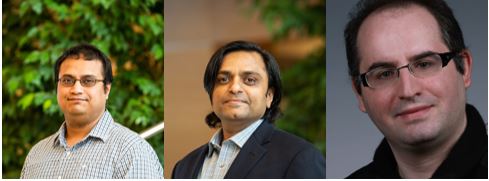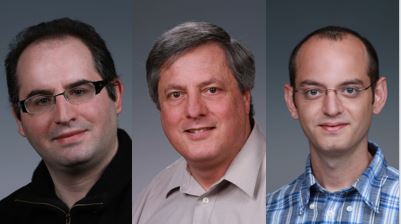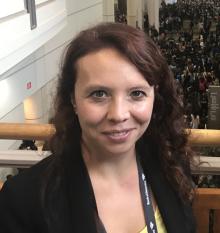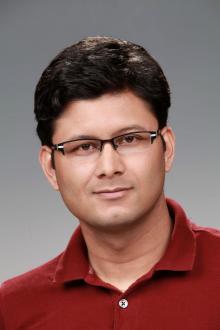Workshops
SC Virtual Student Clustering Competition (VSCC): Mystery Application

Students@SC: Sunday–Wednesday, November 8–11
The Student Cluster Competition (SCC) provides an immersive high performance computing experience to undergraduate and high school students. Student teams are given tasks to complete within 72 hours, and winners in several categories are selected on the basis of the scores set by the judges.
Although these tasks are known in advance, every year there is a “mystery” application which is not revealed until the competition begins. PNNL's miniVite, developed by Sayan Ghosh, Mahantesh Halappanavar and Antonino Tumeo, was chosen as the “mystery” application for 2020. Sayan Ghosh received a complimentary registration to SC20 for participating as the mystery application judge in SCC.
10th Workshop on Irregular Applications: Architectures and Algorithms
Workshop: Wednesday, Nov. 11, 7 a.m. PST/10 a.m. EST, Track 4

Data-intensive applications have a set of methods and data structures that can have irregular memory access, control flows, and communication patterns. All of these can lead to poor performance.
The solution to breakthroughs with these challenges is collaboration among researchers with different expertise.
PNNL computer scientists Antonino Tumeo, John Feo, and Vito Castellana will lend their own expertise to help fellow researchers identify challenges and provide promising solutions in the 10th edition of this workshop. They will chart a path of required breakthroughs to enable upcoming computing systems to process the new generation of data-intensive, irregular applications more efficiently. The workshop will feature two distinctive keynote addresses—one focused more on the computing architecture and the other on the software layers. The interactive panel - with five distinguished early and middle career researchers – will discuss applications and benchmarks, as well as the six full and two short accepted papers.
AI4S: Workshop on Artificial Intelligence and Machine Learning for Scientific Applications
Workshop: Friday November 13, 7 a.m. PT/10 a.m. ET, Track 11

AI can potentially revolutionize the way scientific problems are approached and solved by replacing first principle computation with fast and accurate AI models and/or pairing AI with traditional simulation, AI can accelerate the rate of scientific discoveries. While in many fields, including self-driving cars, object recognition and tracking, and natural language processing, AI methods are robust and mature, applying AI to scientific applications is still a field in its infancy, and the tradeoffs between accuracy and performance are not well understood.
PNNL’s Gokcen Kestor and Dong Li of the University of California, Merced, will lead the first workshop on AI and machine learning for scientific applications (AI4S), which aims to bring experts together from many domains, including computational, data, and computer scientists. The workshop also brings domain and engineering experts together to evaluate potential application of AI to scientific applications, discuss the implication of this novel scientific paradigms, and identify initial challenges and opportunities. The keynote speaker is Steve Lee, who is a program manager for the U.S. Department of Energy where he leads research activities in Scientific Artificial Intelligence and Machine Learning.
Fourth International Workshop on Emerging Parallel and Distributed Runtime Systems and Middleware
Workshop: Friday, Nov. 13, 7:05 a.m. PT/10:05 a.m. ET, Track 9

As new hardware designs and computing environments grow in complexity and variety, new system software needs to be able to match those changes.
The software must meet the requirements of a scientist in need of an efficient infrastructure for their simulation, a mathematician interested in exploring a large space of possible solutions, and data scientists dredging a vast number of data files to confirm a hypothesis.
However, classical system software designs have “baggage” based on years of development and methodologies that will not adapt easily to the new emerging designs.
PNNL computer scientist Joseph Manzano and Joshua Suetterlein are among the session chairs for a workshop that will discuss revolutionary ways to think about computing, including the development or improvement of layers of system software related to infrastructure and novel methodologies. These ideas should influence the development of new software layers or enhance existent ones with novel mapping to the emerging diversity found in computing substrates.
HPC for Urgent Decision-Making (UrgentHPC)
Workshop: November 13, 11:30 a.m. PT/2:30 ET, Track 10

By advancing technological capabilities, responses to extreme events including wildfires and emergencies like car accidents can be improved. These capabilities enable us to develop tools and methodologies for understanding and responding to these events.
Researchers are interested in bridging the technological gap in processing fast and high volume real-time data near their source and integrating them into simulation and decision-support models in high-performance computing systems.
PNNL computer scientist Vinay Amatya is moderating this workshop with Nick Brown of the University of Edinburgh, Deidre Brucker from the National Center for Atmospheric Research, and Thierry Goubier of the French Alternative Energies and Atomic Energy Commission to showcase research findings and software tools that are being developed to support urgent decision-making and to enable real-time scientific applications.
Locality-Aware Scheduling for Scalable Heterogenous Environments

Workshop: Friday, November 13, 1 p.m. PT/4 p.m. ET, Track 7
Heterogeneous computing promises to boost performance of scientific applications by allowing massively parallel execution of computational tasks. Manually managing extremely heterogeneous, multi-device systems is complicated and can result in suboptimal performance. It creates challenging problems with data management on multi-device systems.
PNNL’s Roberto Gioiosa, Ryan Friese, and Alok Kamatar introduced two locality-aware schedulers for the Minos Computing Library (MCL), an asynchronous, task-based programming model and runtime for extremely heterogeneous systems. Their results show that locality-awareness greatly benefits applications that exhibit data reuse, providing up to 6.9× and 7.9× over the original MCL scheduler and equivalent OpenCL implementations, respectively. The schedulers also introduce negligible overhead compared with the original MCL scheduler and achieve similar performance for applications that do not benefit from data locality.